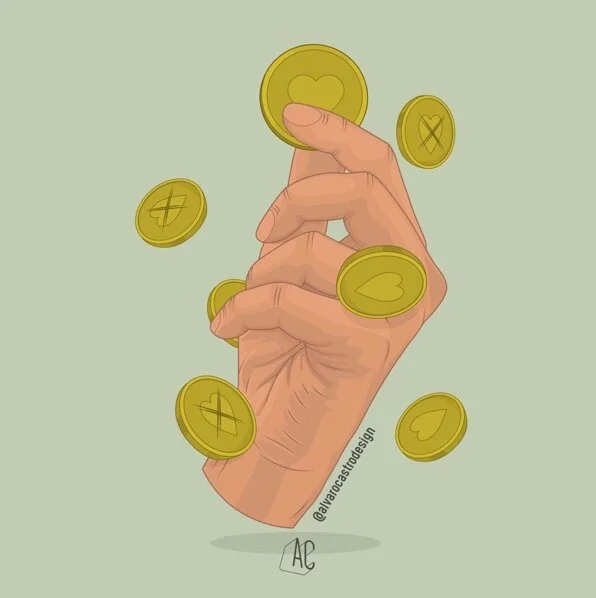Glossary of Curiosity: Sex-Positive and Non-Monogamous Terms
~ A List Foxy Curiosities & Definitions for Challenging the Status Quo in Love, Sex & Relationships ~
Shared language and common understanding are vital pillars in human culture. As you explore the sex-positive community, you may find yourself swimming in jargon and acronyms.
Although this development of shared language is done intentionally to be as inclusive as possible and to facilitate conversations about subjects, feelings, and situations otherwise not talked about - it can initially feel alienating. We want to help.
We’ve compiled a list of terms - used in our blog, podcast, on our social, and commonly in the sex-positive and non-monogamous communities - to serve as a growing glossary for the curious.
There is also no “Merriam Webster for Sex-Positive People” so some of these standard terms may be interpreted differently by different folks. We’ve done our best to include a comprehensive list of words and definitions, but this is by no means exhaustive. As always we’ve tried to include opportunities for you to do further research, and there are links sprinkled throughout to help you dive down the research rabbit hole.
If you think of something that might be missing from our list, please let us know in the comments.
...
Attachment Patterns - The way in which our sense of wholeness and safety are affected by the relationships in our lives. Our adult attachment patterns are thought to be echoes of our relationships with our primary caregivers (traditionally our parents) during our developmental years (essentially our childhood). Attachment theory was formulated by psychiatrist and psychoanalyst John Bowlby.
Aromantic - A term for a person who does not get romantically attached to others, but may develop sexual attractions.
Asexual - A person who is not sexually attracted to others or may not feel a desire for sexual intimacy, but can develop romantic attractions.
BDSM - An acronym for a variety of often erotic practices, lifestyles, and consensual activities between informed and sane adults practiced safely. It stands for Bondage and Discipline (B&D), Dominance and Submission (D&S), and Sadomasochism (S&M). People can take on various identities depending on their role in these dynamics such as a Dom, sub, Daddy, Mistress...etc. There are tons of terms and definitions that go under this umbrella, further reading available here. *A glossary within a glossary - GLOSS-CEPTION!*
Cheating/ Infidelity - A violation of relationship agreements between all the parties in the relationship. Cheating/infidelity can occur in any relationship design monogamous or non. It can be a physical, sexual and/or emotional connection which takes place outside of the agreed upon boundaries and agreements of a relationship(s). It’s advisable to agree on a definition of cheating within each relationship.
Chosen Kinship/ Chosen Family - A phrase used by the sex-positive community to identify “non-traditional” relationships without reinforcing cis, heteronormative monogamy as the center or norm. This can also include a group of people who decide to bond together in a structure akin to a bio-family.
Cis-Gender - A person who identifies with the gender they were assigned at birth (e.g., a person assigned female at birth who identifies as a woman). Cis is a word-forming element meaning "on the near side of, on this side," from Latin preposition cis "on this side."
Compersion - A feeling of joy from others’ pleasure, specifically celebrating your partner(s)’ joy from other relationships in a polyamorous structure. The term was coined about forty years ago using a ouija board – seriously! Compersion is a relative term, and as a result, it can mean so many different things to people. Some feel compersion (compersive) and jealousy simultaneously, while it is often mentioned as the opposite of jealousy and envy. Compersion is a common topic of conversation and reflection within non-monogamous dialogue.
Couples Privilege - Social, cultural, and personal prioritization of the dyadic relationship (such as marriage, long-term boyfriend/girlfriend, etc.) over other relationships or people. Couples-privilege assumes that the needs of the couple surpasses the needs of everyone else involved in the relationship. (See also veto power.)
Demisexual - A person of any sexual orientation or identity that is only sexually attracted to someone when they have an emotional bond with the person.
Don’t Ask; Don’t Tell (DADT) - A relationship agreement where one or all partners have agreed to be involved with other people and not to share information about their extra-relational activities with each other.
Erotic Blueprints - Developed by sexologist Jaiya, these are the individual ways that we are wired for arousal, pleasure, turn-ons/ turn-offs, and sexual needs. The 5 Erotic Blueprints are Energetic, Sensual, Sexual, Kinky, and Shapeshifter.
Ethical Non-monogamy (ENM)/ Consensual Non-Monogamy (CNM) - A relationship structure in which the partners agree to be sexually and/or emotionally non-exclusive. Therefore, consensual, or ethical non-monogamy is not cheating because the partners involved are in agreement about having partners outside of the relationship. This structure requires self-awareness, willingness to engage in ninja-level communication, and emotional self-regulation. Any relationship structure (e.g., stranger sex, random hookups, swinging, friends with benefits/situationships, relationship anarchy, polyamory, etc.) can engage in Consensual Non-Monogamy (CNM) and Ethical Non-Monogamy (ENM), its defining characteristic is disclosure. The primary tenant of CNM/ ENM is that all parties are informed and aware and, therefore, able to make informed decisions based on their desire and preferences.
Fluid Bonding - The decision by sexual partners to stop using barrier methods for safer sex (condoms, dams, gloves, etc.) designed to stop boldly fluid exchange. Being “fluid bonded” can be considered a sign of deeper commitment or intimacy, and one way of distinguishing hierarchy in relationships.
Genderfluid/ Gender Nonconforming - A person who does not identify themselves as having a fixed gender (i.e., male/ female). Also referred to as non-binary or gender queer, these terms denote a spectrum of gender identities that are not exclusively masculine or feminine, and may include appearance or behaviors that challenges prescriptive social norms or is different than one’s assigned sex.
Heteroflexible - A person whose sexual orientation or situational sexual behavior is characterized by occasional homosexual engagements in an overall or otherwise heterosexual orientation.
Heteronormative - A term denoting heterosexuality as the center, normal, or preferred sexual orientation and promoting all others as undesirable or less valid.
Hierarchy vs. Non-Hierarchy - Hierarchy is an established ranking of lovers or partners where some/one has priority or primary status over others. This can look like time spent together, decision making, future planning...etc.
Non-hierarchy is the opposite approach where all partners are given equal ranking and equal expectations.
Hinge (aka Pivot) - Refers to the person at the center of a “V” structure where they maintain a relationship with two people who don’t have a romantic relationship with each other.
Homoflexible - A person whose sexual orientation or situational sexual behavior is characterized by occational heterosxual engaments in an overall or otherwise homosexual orientation.
Jealousy - Refers to the thoughts or feelings of insecurity, fear, and concern over potential loss, abandonment, being replaced or lack of safety. Although stigmatised, jealousy is a typical experience in human relationships of any design, monogamous or non, and it has been observed in infants as young as five months. Note: There is a distinction between jealousy (which refers to “I want that” vs. envy (which refers to “I want that too”); in the latter case envy expresses a desire to have the same experience as someone else without taking that experience away from the other person.
Kink - Non-conventional sexual practices, concepts, or fantasies. The term derives from the idea of a "bend" (cf. a "kink") in one's sexual behaviour, to contrast such behaviour with "straight" or "vanilla" sexual mores and proclivities. Kinky thoughts and behaviour are welcomed and are often celebrated in the sex-positive communities, as long as they are between consenting, informated, sane adults, practiced safely.
Kitchen Table Polyamory - A phrase used - occasionally literally - to refer to a supporting and accepting atmosphere among a group of people in a relationship together, where all of the members get along well enough to be able to sit around at a kitchen table with one another and break bread.
Leather Family - Predominantly a part of the kink community, are complex and individualized bonded structures, usually by invitation, that adhere to a prescribed structure, protocols, and rituals. Think the sex-positive, chosen kinship version of a “nuclear family.”
LGTBQIA+ - An acronym used to denote diversity of sexuality and gender identity. It is often a blanket term used to refer to anyone who is non-heterosexual or non-cisgender. It stands for lesbian, gay, transgender, bisexual, queer, intersex, agender, asexual, ally. Sometimes referred as the queer alphabet.
Metamour - Is poly lingo for your partner’s partner. This could refer to a serious relationship or something much more casual.
Mono/ Monogamy/ Monogamous - A relationship style that includes only two partners romantically, sexually, and logistically (eg. sharin a home, legal marriage).
Monogamish - A term coined by sex columnist Dan Savage in 2011 to describe a relationship structure that is mostly monogamous. Such relationships have an agreement that allows for some sexual contact outside the primary relationship.
Nesting/ Anchor Partner - A term used to identify one partner in an open structure that shares a home or finances with another without implying hierarchy or priority over other relationships.
New Relationship Energy (NRE) - The state of mind experienced at the beginning of a fresh relationship that often involves higher excitement, both sexual and emotional. NRE is a neurobiological truth created by a potent cocktail of oxytocin and other chemicals naturally produced by our bodies when we experience joy, pleasure, and happiness.
New Relationship Energy (NRE) Redistribution - Occurs when NRE is used to fuel or reignite existing relationships. For example, when someone feels more sexually charged or creative as the result of a new relationship, and brings that sexual energy and appetite to their existing relationship.
Non-binary - A person(s) who does not identify with a fixed place on the gender scale. Their identity does not fit within the binary: feminine or masculine.
Open Marriage - A married couple who have agreed to a structure in which sexual interaction with someone other than their spouse is an available option to one or both parties. Some celebrities, including Jada and Will Smith, have popularized the conversation around this concept in the media. Open marriages can take many forms, including DADT, polyamory, or swinging.
Open Relationship - A structure that can be used to describe any relationship in which sexual interaction with someone other than a primary partner is agreed upon. One typical example is swinging or DADT sexual relationships. Open relationships, consensual/ ethical non-monogamy, and polyamory are often used interchangeably, however they represent different relationship styles. Consensual/ ethical non-monogamy represents a broad umbrella of relationship construct where sexual and/or emotional fidelity is not required within the relationship(s). Open relationships often focus on sexual freedom within relationship(s), and polyamory generally refers to multiple emotional/ loving romantic committed partnerships that may or maynot be sexual.
Polyamorous/ Poly/ Polyam - Meaning multiple loves, this is a relationship structure in which individuals openly engage in more than one romantic relationship simultaneously. These relationships can exist in many configurations. Many people utilize a framework in which they have a primary partner and secondary/ auxiliary partners, whereas others prefer a non-hierarchical system for relating to various partners. They are many reasons individuals choose to practice polyamory, such as differing sex drives or a desire for different kinds of intimacy.
Polygamy - Not the same as polyamory. Polygamy is a marriage consisting of more than two people. Though polygamy is one of the most recognized terms within non-monogamy, it is specific to marriage (logistical) and is less relevant when discussing intentional relationship design.
Polygyny - A polygamous marriage in which a man has more than one wife.
Polycule - Coined by Kimchi Cuddles creator Tivka Wolf, is a connected network of people in non-monogamous relationships. The term is inspired by a model of a chemical molecule, which uses lines, circular shapes, or symbols to indicate bonds between atoms.
Polyfidelity - A term coined by the Kerista commune, is sexual or deeply emotional fidelity among many. In polyfidelity relationships, individuals commit to limiting their emotional and/or physical connections to those partners.
Polyflexible - A person who can thrive in both a polyamorous or a monogamous relationship.
Poly/ Mono Mismatch - A discrepancy between the relationship structures desired by any parties in a relationship - where one person identifies as polyamorous and the other person identifies as monogamous. This mismatch, understandably, can often cause issues in a relationship, with open, honest, and empathetic communication being key. Not every poly/mono relationship is a mismatch.
Primary Partner - A term often used to refer to one partner in a relationship structure ranked above others based on emotional intimacy, intertwinement - financial or practical (eg. children), etc. and is ordinarily indicative of a relationship hierarchy. Note: Some do not view “primary” by a hierarchical definition, but it is a widely held norm.
Pronouns/ Gender Pronouns - The pronoun(s) that a person would like to use when talking to or about that individual. For example: “she/ her/ hers,” “he/ him/ his,” ze/ hir/ hirs,” and “they/ them/ theirs.” Preferred pronouns offer space for individuals to decide the language others can use about them to express their gender narrative outside a prescription (bio, societal, etc.). Note: There has been a shift away from the term “preferred pronoun” because an individual’s pronouns are not just preferred; they are the pronouns that should be used when speaking with or about them.
Quad - Four partners love one another together, either as a unit or two couples.
Relational Orientation - Is an enduring pattern of romantic attraction to persons of the opposite sex or gender, the same sex or gender, or to both sexes or more than one gender
Relationship Anarchy - A relationship style in which there are no labels or defined structures, and participants do not rank or assign a particular value to sexual or emotional relationships. Written about by Andie Nordgren, who coined the term, relationship anarchy speaks to the abundant love, respect, and uniqueness of relationships. It operates from a core set of values - rejecting the burden of “norms” and “should’s”, and instead being intentional about your commitments.
Relationship by Design - A process developed by Effy Blue for defining unique individualized, loving relationships based on clear expectations, communication of needs, structure preferences, and desires.
Risk Tolerance - Is the spectrum of the level of risk to which an individual is willing to be exposed while performing an action or pursuing a goal. Eg. some people are willing to jump out of planes while others wait for the walk sign to cross a deserted street - and everything in between.
Secondary/ Tertiary Partner - The person(s) in a hierarchical relationship who, either by intent or circumstance, have a relationship that is not prioritized (time, energy, etc.) as highly as that of the primary partner. The secondary/ tertiary can be casual in expectation or more serious depending on the involved parties’ capacity and desires.
Serial Monogamy - A relationship style wherein one person engages in a series of monogamous relationships, often long term, without taking a break to be solo or date casually.
Sex Worker - A person whose profession is within the sex industry. Sex professions span a broad industry, from entirely online and various degrees of anonymous - such as online panty sellers, cam work, and phone sex workers; to in-person and hands-on roles - such as pro doms, massage parlor workers, and strippers; to fully public and even famous - such as porn stars.
Sexual Orientation - The way a person identifies in their physical or romantic life. It can include defining characteristics that span gender to personality traits of a person they love/ are aroused by.
Solo Poly - An individual who identifies as polyamorous and often acts as their own primary partner. They do not usually cohabitate or commingle finances with any of their partners.
Swinging - An activity that typically involves emotionally monogamous couples switching partners for sex in a recreational or social setting. Typically swinging does not entail emotional intimacy or romance outside of sexual encounters.
Transgender - A person whose gender identity does not correspond with their birth sex/ the gender they were assigned at birth. Since this definition can be quite broad, it is always best to defer to one's self-identification.
Triad/ Thruple - Three partners that love each other as a unit.
Unicorn - A person - most often a cis-gendered, bisexual female, though not always - who agrees to join an existing - usually hetero, cis-gendered - couple. The relationship generally relies on the presumption that the unicorn will date and have sex with both parties in the couple but not develop expectations or do anything to jeopardize the existing structure. “Unicorn Hunters” are often seen as “superficially poly” by the community, and there are many inherent problems for the woman involved. Some common, unbalanced, expectations set for a Unicorn are that they remain single, involve themselves equally with both members of the couple, and, even, occasionally operate as a pseudo-mother/housekeeper to complete a family structure.
Vee - A relationship structure in which one person is the common connection in the group. Often this relationship structure changes dependant on its hinge.
Veto Power - A relationship agreement, most common in prescriptive hierarchical, primary/secondary relationships, that gives unilateral power to say no. The no can be an ending to something or a preventative measure and has to do with another person’s additional relationships or the activities therein (ex. Sexually or BDSM specific). A veto may be absolute or conditional and not all polyamorous people recognize or permit veto power.
To hear more curious and courageous stories, subscribe to Curious Fox for free. Each week you will find more stories and lessons, as well as ways that you can explore your curiosity. You can find more from Jacqueline Misla on Instagram and Facebook.































